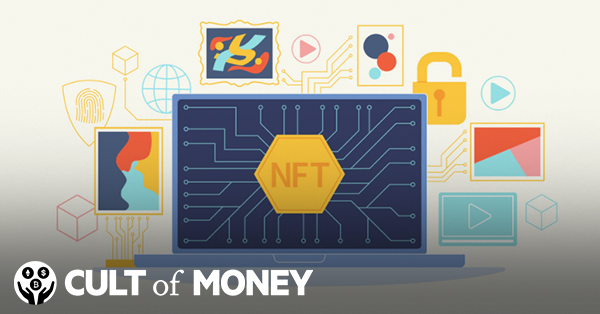
Digital assets, like cryptocurrency and non-fungible tokens (NFTs), have been growing in popularity and are being purchased more than every before.
But what happens when you sell your digital assets?
Well, you might make some money if the cryptocurrency or NFT you bought has increased in value. At the same time, though, Uncle Sam will want a cut of your gains.
If you sell digital assets, you need to be ready to pay taxes. Here’s how it works and how crypto and NFT tax rates are determined.
How Does The IRS View Digital Assets?
The critical thing to understand is that the IRS sees digital assets as, well, assets. When you own an asset, and you sell it for more than you bought it for, the IRS expects you to pay taxes on your gains. Your cryptocurrency and NFT investments are no different.
Since 2014, the IRS has treated crypto as property, similar to a stock or a bond. There isn’t a lot of clear guidance on NFTs just yet. They’re considered property as well. But there’s a possibility that NFTs could be seen as collectibles — resulting in a higher tax rate for those with higher net worths.
How Do Taxes Work With Crypto And NFTs?
Figuring out your capital gains on any asset, including cryptocurrencies and NFTs, is relatively straightforward. You start with your cost basis -- the price you paid for the asset or the its value when it was given to you. Then, after you sell the item, you subtract that cost basis from the total amount you received.
Cryptocurrency Sale Example
In 2011, I was given a single Bitcoin (BTC) for some work accomplished. At the time, a bitcoin was worth right around $4. That’s my cost basis.
Earlier this year, I sold half a bitcoin and received $16,340 after transaction fees were subtracted. My gain — the amount I’ll be taxed on — was $16,336.
NFT Sale Example
With NFTs, the situation can get a little dicier, mainly because you have different taxable events to account for, depending on how things play out. When I buy and sell NFTs, I use the Ethereum blockchain. So Ether (ETH) is the cryptocurrency used.
Back in 2017, I bought $100 worth of ETH when it was sitting at right around $12 (that’s a little more than eight Ether tokens). Toward the end of 2020, in December, I bought an NFT for 0.5 ETH. At the time, Ethereum was hovering at right around $586. Buying the NFT triggered a taxable event. Basically, I had to sell some Ether to complete the transaction at a value of $293. With a cost basis of $12 and gas fees amounting to about 50 cents, my total gain was $281.50 ($293 - $11.50).
Ok, so far, so good. When I used my Ether to pay for an NFT, I had one taxable event. Now, what happened when I sold the NFT in March for $700? Well, that’s a new taxable event. To figure out that event, I started with my cost basis, which was the $293 value of the NFT when I bought it. So, 700 - 293 = 407. I can subtract my $18 gas fee from the gain to come out with a total gain of $389.
So, by buying and selling an NFT, I ended up with two different gain amounts from two different taxable events.
Cryptocurrency Conversion Example
Similarly to how it’s a taxable event when you use crypto to buy an NFT, it’s also taxable when you convert one crypto to another.
When I purchased Shiba Inu (SHIB) a few months ago, the purchase itself wasn’t a taxable event. However, I recently took some of my profits from SHIB and converted them to MANA. That event was taxable, based on the values involved.
How Crypto And NFT Tax Rates Are Determined
When you capture gains on an asset by selling it, how you’re taxed depends on how long you held it before getting rid of it.
Short-Term vs. Long-Term Capital Gains
If you hold something for a year or less, it’s considered a short-term asset, and you’re taxed at your regular marginal tax rate. On the other hand, if you hold an asset for more than a year, you’re taxed at the long-term capital gains rate (which is usually more favorable).
In the case of the Ether I used to buy that NFT, I’d held it since 2017 — longer than a year. So that $281.50 gain is taxed at the long-term rate. However, the NFT itself was held for only a few months. So my $389 gain from selling it is a short-term gain and taxed at a different rate.
For 2021, long-term capital gains are taxed at 0%, 15%, or 20%, based on your income. For example, many people won’t end up paying capital gains taxes on long-term gains if they make less than $80,000 per year.
2021 Long-Term Capital Gains Rate | Single | Head of Household | Joint |
|---|---|---|---|
15% | $80,000 - $441,450 | $80,000 - $469,050 | $80,000 - $496,600 |
20% | $445,851+ | $469,051+ | $496,601+ |
So, even though I’m in the 24% tax bracket for the 2021 tax year, my long-term capital gains rate — including the money I received for selling my bitcoin — is 15%.
What About The Collectible Rate For NFTs?
One of the exceptions to the top rate of 20% on long-term capital gains is for collectibles. This is where things get a bit murky when it comes to taxes. NFTs might end up being classified as collectibles for tax purposes, along with art, classic cars, baseball cards, and other similar items.
Because NFTs often include artwork, and they’re sometimes kept for reasons other than wealth accumulation, they could potentially be seen as collectibles. Gains from collectibles can be taxed at a 28% top rate. So those at a threshold to be taxed at 20% for long-term capital gains might see the higher rate. However, for those earners, even the 28% rate levied on collectibles is still probably lower than their marginal tax rate.
When you file your taxes, you’ll have to fill in the information using cost basis and market value at the time of sale to calculate what you owe. The good news is that if you had losses, you could use those to offset your gains. I sold some losing investments earlier in the year, and the losses from those investments will reduce the size of my gains, helping me with my tax bill.
Keep Track Of Your Crypto And NFT Transactions
If you’re buying, selling, and trading crypto and NFTs, you’ll need to keep track of your transactions. Here are some details you'll want to note as you track your crypto and NFT transactions:
- How much you bought and the value in U.S. dollars (or your local currency)
- When you sell, how much you sold, and the value in U.S. dollars
- If you convert your crypto to another token or use it to buy an NFT, the U.S. dollar value of the amount you’re selling or converting
- The amount and U.S. dollar value of the new asset, whether it’s a different token or an NFT. This will be used as your cost basis for the new asset down the road.
- Fees associated with your transaction, including gas fees and miner fees, if applicable. You can subtract the fees you pay from your gains.
- The gain (or loss) from the transaction
When using an exchange like Coinbase or Gemini, or trading crypto with an app like Robinhood or Webull, you can see your transaction history, helping you keep track of your cost basis and gains.
Otherwise, you might need to keep track of your transactions on your own. You might be able to use a spreadsheet or a tool like Kubera to track your transactions.
Final Thoughts
While there are still some gray areas in the way cryptocurrencies and NFTs are treated by the IRS, what we do know is that some amount of taxes will be owed any time you sell a digital asset for a profit.
Pay taxes on your gains as required by law and keep track of everything. If you’re ever audited, you want to have good records at your disposal.
Most of my crypto is in cold storage, purchased or received before the end of 2017. I keep a piece of paper with a list of what’s in the wallet, the amount I bought, and the price I paid in the safe where I hold my storage and important documents.
Don’t let tax time surprise you with a large tax bill on your crypto trades. Plan and prepare for the taxes you’ll likely owe.

Miranda Marquit, MBA, has been covering personal finance, investing and business topics for more than 15 years, and covering crypto topics for more than 10 years. She has contributed to numerous outlets, including NPR, Marketwatch, U.S. News & World Report and HuffPost. She is an avid podcaster, co-hosting the podcast at Money Talks News. Miranda lives in Idaho, where she enjoys spending time with her son playing board games, travel and the outdoors.
